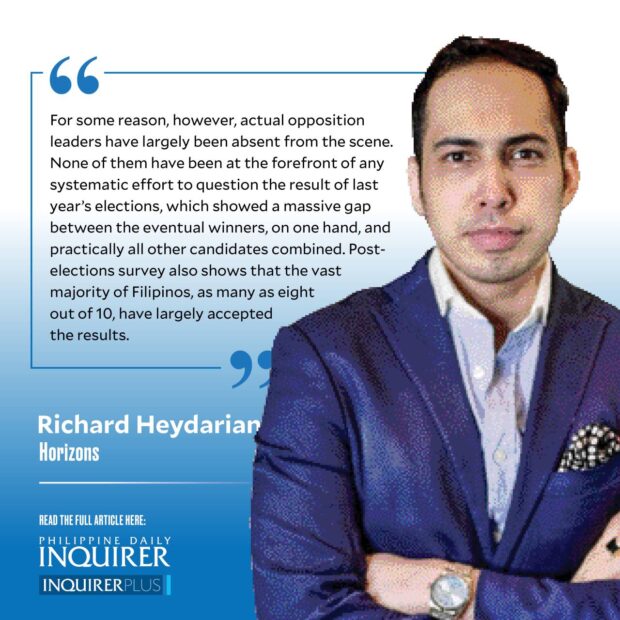Philippines: A crisis of opposition?

On one hand, the National Citizens’ Movement for Free Elections has raised concerns over alleged “discrepancies,” namely how the “vote counting machine (VCM) source code differed from the hash code,” which, according to Bondoc, “indicated possible program tampering.” Meanwhile, former general and Department of Information and Communications Technology (DICT) secretary Eliseo Mijares Rio Jr. has been “disputing the physical impossibility of 20-million plus votes within an hour of closing” of the precincts in 2022 elections.
The former DICT chief along with retired Col. Leonardo Odoño have also accused the Commission on Elections of “deception” for allegedly handing over, per court ruling, the “reception logs” rather than “transmission logs” of last year’s elections. According to Bondoc, the two former soldiers “suspect that results were fabricated to project 20 million-plus votes within one hour from 7 p.m. precinct close” to create a “winning trend” and “condition the public mind” for the eventual winners.
Article continues after this advertisementIt goes without saying that absent a thorough and independent investigation by a panel of experts, especially those with an information technology background, it’s hard to come up with conclusive statements. There has, however, been extensive documentation of “upstream” election-related anomalies, namely vote-buying, by groups such as the Asian Network for Free Elections. In short, before even discussing alleged fraud in vote “count,” which often descends into minutiae technical debates, one must look at potential fraud before votes were even cast.
Regardless of their veracity, allegations of widespread fraud tend to be attractive, precisely because they assuage the pain of the losing party. As for the 2022 elections, such allegations also reinforce confidence in conspiracy theories against polling agencies in the country, which accurately projected the final results, as well as in suboptimal “surveys,” most notably Google Analytics, which only measures online interest by a (small) portion of Filipino population (including nonvoters) enjoying reliable internet connection.
For some reason, however, actual opposition leaders have largely been absent from the scene. None of them have been at the forefront of any systematic effort to question the result of last year’s elections, which showed a massive gap between the eventual winners, on one hand, and practically all other candidates combined. Post-elections survey also shows that the vast majority of Filipinos, as many as eight out of 10, have largely accepted the results.
Article continues after this advertisementYes, we need to ensure maximum transparency and credibility in elections. Allegations of fraud should be properly addressed. But, dear reader, this should not distract the opposition from another important task: effectively rebuilding itself after not one, but arguably three bruising election defeats, notwithstanding Leni Robredo’s historic victory in the vice presidential race in 2016. Just to put things into context: In 2019, the opposition, for the first time in 80 years, struggled to win even a single seat, while there was a clean sweep in last year’s elections for the Marcos-Duterte axis.
And yet, it’s not clear whether the opposition has even done a proper reflection paper beyond de rigueur efforts to fight disinformation. Across the world, major parties conduct, per standard operating procedures, various forms of post-mortem analysis following election defeats to analyze points of weakness and practical areas of focus for succeeding elections. For instance, was the opposition too late in choosing its presidential candidate? Was enough effort dedicated to creating a united opposition? Was there enough preparation ahead of the elections, especially against a formidable Marcos-Duterte tandem? Was the emphasis on “radical love” the most effective communications strategy, when surveys showed leadership, competence, and decisiveness were a top priority for voters? Was the emphasis on Google Analytics really helpful? Should there have been a more concerted effort to rein in “elitist” supporters, especially online, and crack down on charlatans spreading conspiracy theories against authoritative polling agencies?
Against all odds, Leni inspired a whole movement through her heroic elections last year. But the “Pink Movement” needs both sustained leadership and organization, as well as a clear blueprint to win a more progressive future for the Philippines.
rheydarian@inquirer.com.ph
















